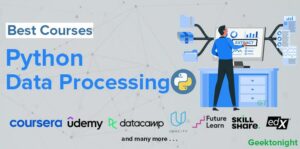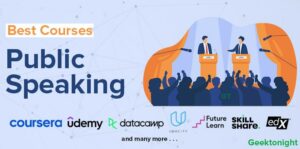Database courses play a pivotal role in today’s technology-driven world, where data is the backbone of numerous industries and organizations. Whether you are a beginner aiming to enter the field of database management or an experienced professional seeking to enhance your skills, choosing the best database courses is essential for your learning journey.
In this article, we will review a selection of top-notch database courses available across various online platforms. These courses are designed to provide learners with comprehensive knowledge and practical skills in areas such as database design, SQL programming, data manipulation, and database administration.
Why learn Database?
In today’s data-driven world, the importance of database engineering cannot be overstated. Database engineering skills are in high demand across industries. According to the U.S. Bureau of Labor Statistics, employment of database administrators is projected to grow 10% from 2020 to 2030, faster than the average for all occupations. Learning database engineering provides opportunities to work with cutting-edge technologies such as cloud-based databases, NoSQL databases, and big data platforms. These skills are highly valued in the ever-changing tech landscape.
Table of Content
- 1 Best Database Courses, Certification, Tutorials, Training, Classes Online
- 1.1 Meta Database Engineer Professional Certificate by Meta [Coursera]
- 1.2 Data Manipulation with Python [Datacamp]
- 1.3 Databases for Data Scientists Specialization by University of Colorado Boulder [Coursera]
- 1.4 Professional Certificate in Data Warehouse Engineering by IBM [edX]
- 1.5 Learn SQL for Database [Udacity]
- 1.6 Database Design and Operational Business Intelligence Specialization [Coursera]
- 1.7 Introduction to Relational Databases (RDBMS) [Coursera]
- 1.8 Database Systems Concepts & Design [Coursera]
- 1.9 Oracle Autonomous Database Administration [Udacity]
- 2 FAQ
Our product recommendations are unbiased and based on an independent review process. We may receive a commission for links to recommended partners. See our advertiser disclosure for more information.
Best Database Courses, Certification, Tutorials, Training, Classes Online
- Best Meta Database Engineer Professional Certificate by Meta [Coursera]
- Best for Python Data Manipulation with Python [Coursera]
- Best for Data Scientist Databases for Data Scientists Specialization by University of Colorado Boulder [Coursera]
- Best for Data Warehouse Professional Certificate in Data Warehouse Engineering by IBM [Coursera]
- Best for SQL Learn SQL for Database [Udacity]
- Best for BI Database Design and Operational Business Intelligence Specialization [Coursera]
- Best for RDBMS Introduction to Relational Databases (RDBMS) [Coursera]
- Best for Basics Database Systems Concepts & Design [Coursera]
- Best for Oracle Oracle Autonomous Database Administration [Udacity]
Meta Database Engineer Professional Certificate by Meta [Coursera]
This Coursera Database course is one of the best online programs designed to equip learners with the necessary skills and knowledge in learning databases. This program is taught by industry-recognized experts at Meta and will be teaching you the key skills required to create, manage and manipulate databases.
Course Instructor
Coursera Professional Certificate in Meta-Database Engineering is taught by the team of Meta, which are experienced instructors who have extensive expertise in data engineering and database systems.
What You’ll Learn
- Demonstrate proficiency of SQL syntax and explain how it’s used to interact with a database.
- Create databases from scratch and learn how to add, manage and optimize your database.
- Write database driven applications in Python to connect clients to MySQL databases.
- Develop a working knowledge of advanced data modeling concepts.
Pros & Cons
Pros
- Well-structured and organized course materials
- Emphasis on practical implementation
- Flexibility in learning
Cons
- Limited availability of live instructor interaction
Key Highlights & Learning Objectives
- Learn Core techniques and methods to structure and manage databases.
- Understand advanced techniques to write database-driven applications and advanced data modeling concepts.
- MySQL database management system (DBMLearning database engineering provides opportunities to work with cutting-edge technologies such as cloud-based databases, NoSQL databases, and big data platforms.
- How to prepare for technical interviews for database engineer roles
- Demonstrate proficiency in SQL syntax and explain how it’s used to interact with a database.
Who is it for?
This Coursera Database course is designed for individuals who have a foundational understanding of database systems and are looking to specialize in meta-database engineering. It caters to data engineers, database administrators, software developers, and IT professionals seeking to enhance their skills in designing, managing, and optimizing complex database systems.
Rating: 4.6/5
Students Enrolled: 46,719
Duration: 6 months, 6 hours/week
Data Manipulation with Python [Datacamp]
This online Database course offered by DataCamp is designed to equip learners with essential skills and techniques for effectively working with data using the Python programming language. This comprehensive course covers various aspects of data manipulation, enabling participants to gain a solid foundation in data analysis and manipulation using Python.
Course Instructor
It is taught by Richie Cotton, Maggie Matsui and several other experienced professionals who are teaching thousands of students with their deep understanding of data manipulation and Python programming.
Pros & Cons
Pros
- Comprehensive Curriculum
- Practical Approach
- Interactive Learning for self-assessment
Cons
- Limited Emphasis on Data Visualization
Key Highlights & Learning Objectives
- Learn fundamental data manipulation techniques using Python.
- Understand essential libraries such as NumPy, pandas, and more.
- Know about several techniques such as data cleaning, transformation and reshaping.
- Solve hands-on exercises and real-world examples for practical understanding.
- Apply efficient techniques for handling missing data, dealing with outliers, and performing feature engineering.
Who is it for?
This online Database with Python course is suitable for individuals who have a basic understanding of Python and are looking to enhance their data manipulation skills. Whether you are a beginner or an intermediate Python programmer, this course provides the knowledge and tools to become proficient in data manipulation using Python.
Rating: 4.7/5
Duration: 16 hours
Databases for Data Scientists Specialization by University of Colorado Boulder [Coursera]
This amazing database course offered by Coursera is a comprehensive online program designed to equip data scientists with the knowledge and skills needed to effectively work with databases in their data analysis and manipulation workflows. This specialization offers a series of courses that cover various aspects of databases, providing learners with a solid foundation in database management systems and their application to data science.
Course Instructor
This database specialization is taught by experienced instructors such as Di Wu and Alan Paradise who have a deep understanding of databases and their relevance to data science. The instructors bring their expertise to the forefront, delivering high-quality content and practical insights throughout the courses.
What You’ll Learn
- Design effective, efficient databases through normalization and data modeling
- Develop expertise in programming with the Structured Query Language (“SQL”)
- Knowledge about database operations, data warehouse, big data, and NoSQL
Pros & Cons
Pros
- Shareable Certificate
- Peer Interaction
- Flexible Schedule
Cons
- Assumes a basic understanding of data science
Key Highlights & Learning Objectives
- Explore the fundamentals of database management systems in data science.
- Learn SQL (Structured Query Language) and gain proficiency in writing queries to extract and manipulate data.
- Understand the principles of database design for efficient data storage and retrieval.
- Discover techniques for working with big data and distributed databases.
- Gain practical experience by working on hands-on projects that simulate real-world scenarios.
Who is it for?
This Coursera Database certification is suitable for individuals who already have a foundation in data science and want to expand their knowledge and skills in database management. This specialization is ideal for data scientists, data analysts, and professionals working with data who want to leverage databases effectively for data storage, retrieval, and analysis.
Rating: 4.7/5
Students Enrolled: 11,359
Duration: 4 months, 6 hours/week
Professional Certificate in Data Warehouse Engineering by IBM [edX]
The Professional Certificate in IBM Data Warehouse Engineering offered by edX is a comprehensive online program designed to equip learners with the knowledge and skills needed to build and manage data warehouses using IBM technologies. This certificate program is ideal for individuals aspiring to become data engineers or professionals seeking to enhance their data warehousing expertise.
Course Instructor
It features industry experts and IBM professionals such as Jeff Grossman and Rav Ahuja who bring their wealth of knowledge and practical experience to the program. The instructors provide in-depth insights into data warehousing concepts and guide learners through the application of IBM technologies.
Pros & Cons
Pros
- Industry-Relevant Curriculum
- Hands-On Learning
- Recognized Certification
Cons
- Specific to IBM Technologies
Key Highlights & Learning Objectives
- Learn the fundamentals of data warehousing, including its architecture, components, and principles.
- Explore IBM’s data warehousing solutions such as IBM Db2 Warehouse and IBM Netezza Performance Server.
- Understand the design and implementation of data warehouses using IBM technologies.
- Gain hands-on experience by working with real-world data warehousing projects and using IBM tools.
- Discover best practices for data integration and performance optimization in data warehousing.
Who is it for?
The Professional Certificate in IBM Data Warehouse Engineering is suitable for individuals who have a background in data management, database administration, or data analysis and are looking to specialize in data warehousing using IBM technologies. This program caters to both aspiring data engineers seeking comprehensive knowledge and professionals already working with IBM technologies who wish to deepen their expertise in data warehousing.
Rating: 4.6/5
Duration: 9 months, 3-4 hours/week
Learn SQL for Database [Udacity]
Udacity’s Learn SQL course is a comprehensive online program designed to teach learners the fundamentals of SQL (Structured Query Language). SQL is a widely used language for managing and querying relational databases. This course is suitable for beginners who want to gain a strong foundation in SQL and learn how to work with databases effectively.
Course Instructor
This amazing course is taught by knowledgeable instructors such as Malavica Sridhar and Ziad Saab, who have extensive expertise in SQL and database management. They guide learners through the course modules, providing clear explanations, practical examples and hands-on projects to reinforce learning.
What You’ll Learn
- Learn to determine, create, and execute SQL and NoSQL queries
- Perform analysis on data stored in database systems to power strategic decision-making
- Apply relational database management techniques to build the supporting data structures for a social news aggregator.
Pros & Cons
Pros
- Beginner-Friendly
- Interactive Learning
- Practical Projects
Cons
- Limited Coverage of Advanced Concepts
Key Highlights & Learning Objectives
- Understand the fundamentals of SQL including data querying, data manipulation, and data definition.
- Learn how to write complex SQL queries to analyze data from relational databases.
- Explore database design principles for creating efficient and well-structured databases.
- Gain hands-on experience by applying SQL to solve practical data-related problems.
- Learn about advanced SQL topics, such as database joins, subqueries, and aggregate functions.
Who is it for?
Udacity SQL course is designed for beginners who want to learn SQL and gain a solid foundation in working with relational databases. It is ideal for individuals interested in data analysis, database management, or any role that involves working with data. The course caters to learners who prefer a self-paced learning environment and want to acquire practical SQL skills.
Rating: 4.7/5
Duration: 2 months at 10 hours/week
Database Design and Operational Business Intelligence Specialization [Coursera]
This is an excellent database online program designed to provide learners with the knowledge and skills required to design effective data architectures and leverage business intelligence tools for operational decision-making. It covers essential concepts and techniques related to data design and operational business intelligence, equipping learners with valuable skills for data-driven decision-making.
Course Instructor
It is taught by Tim Carrington who possesses in-depth knowledge and practical expertise in data design and operational business intelligence. He will be guiding learners through the courses, offering insightful explanations, practical examples, and real-world case studies to enhance understanding.
What You’ll Learn
- Develop an in-depth understanding of data warehouse design and data manipulation
- Describe what business intelligence (BI) is and what it does
- Gain hands-on experience in SQL coding, data mining models, and data visualization
Pros & Cons
Pros
- Practical Application
- Flexibility and Accessibility
- Extensive Curriculum
Cons
- Prerequisite Knowledge
Key Highlights & Learning Objectives
- Gain a comprehensive understanding of data design principles and techniques.
- Learn to apply industry-standard tools and technologies for data modeling and data architecture design.
- Explore the fundamentals of business intelligence and its role in operational decision-making.
- Understand how to use data visualization techniques to present information effectively.
- Learn how to develop and implement operational business intelligence solutions.
Who is it for?
This database and BI course is suitable for professionals working in roles such as data analysts, database administrators or anyone involved in operational decision-making. It is also beneficial for individuals seeking to expand their knowledge in operational business intelligence. The specialization caters to learners who are motivated to enhance their understanding and gain practical skills in implementing operational business intelligence solutions.
Rating: 4.5/5
Students Enrolled: 2,858
Duration: 3 months, 2 hours/week
Introduction to Relational Databases (RDBMS) [Coursera]
Coursera’s Introduction to Relational Databases is a comprehensive online course designed to provide learners with a solid understanding of the fundamentals of relational databases. This course is suitable for individuals who are new to databases and want to learn the basics of organizing and managing structured data. This course incorporates hands-on, practical exercises to help you demonstrate your learning as it will work with real databases and explore real-world datasets.
Course Instructor
The course is taught by experienced instructors such as Rav Ahuja and Lin Joyner who possess comprehensive expertise in the field of databases. They provide clear and concise explanations, guiding learners through the core concepts and principles of relational databases.
What You’ll Learn
- Describe data, databases, relational databases, and cloud databases.
- Describe information and data models, relational databases, and relational model concepts.
- Explain an Entity Relationship Diagram and design a relational database for a specific use case.
- Implement different relational model constraints.
Pros & Cons
Pros
- Beginner-Friendly
- Hands-On Learning
- Expert Instructors
Cons
- No Personalized Feedback
Key Highlights & Learning Objectives
- Learn the fundamental concepts of relational databases, including tables, relationships, and normalization.
- Understand the SQL (Structured Query Language) for data manipulation and retrieval.
- Explore the importance of data integrity and constraints in maintaining database quality.
- Gain practical experience by working on hands-on assignments and quizzes.
- Learn about database design principles and best practices.
- Access additional resources and forums for discussions and support.
Who is it for?
Coursera’s Relational Databases course is designed for individuals who have little to no prior knowledge of databases but are interested in understanding the fundamentals of relational databases and SQL. This course is suitable for beginners who wish to pursue careers in data analysis, database management, or related fields. It is also beneficial for professionals who work with structured data and want to enhance their understanding of relational databases.
Rating: 4.6/5
Students Enrolled: 51,736
Duration: 18 hours
Database Systems Concepts & Design [Coursera]
Udacity’s Database Systems: Concepts and Design course is a comprehensive online program designed to provide learners with a solid understanding of database systems and their principles. This amazing course covers essential concepts of databases such as data modelling, database design and normalization which form the fundamentals of database design.
Course Instructor
This course is led by skilled instructors like Leo Mark who possess expertise in the field of database systems. They provide engaging lectures, practical examples, and hands-on projects to guide learners through the course material and ensure a comprehensive learning experience.
Pros & Cons
Pros
- Comprehensive Curriculum
- Hands-On Projects
- Self-Paced Learning
Cons
- Prerequisite Knowledge
Key Highlights & Learning Objectives
- Learn the foundational concepts of database systems, including data modelling, schema design, and normalization.
- Explore the different types of database models, such as relational, hierarchical, and network models.
- Understand the principles of database query languages including SQL
- Gain insights into database management systems (DBMS) and their functionalities.
- Apply your knowledge through hands-on projects that involve designing and implementing database systems.
Who is it for?
Udacity’s Database Systems course is suitable for individuals who are interested in learning about database systems and their design principles. It is ideal for beginners or professionals who want to enhance their knowledge and practical skills in database design, data modeling, and query optimization. It caters to learners who prefer a self-paced learning environment and are motivated to gain a strong foundation in database systems.
Rating: 4.5/5
Duration: 16 Weeks
Oracle Autonomous Database Administration [Udacity]
Udacity’s Oracle Autonomous Database Administration course is a comprehensive online program designed to provide learners with the knowledge and skills required to effectively administer Oracle Autonomous Database. It covers essential concepts, tools, and techniques related to database administration in the context of Oracle Autonomous Database.
Course Instructor
This excellent course is taught by experienced instructors who possess expertise in Oracle database administration. They guide learners through the course material, providing detailed explanations, practical examples, and hands-on exercises to enhance understanding and practical skills.
Pros & Cons
Pros
- Completely Free
- Practical Insights
- Self-Paced Learning
Cons
- Oracle-Specific Focus
Key Highlights & Learning Objectives
- Understand the fundamentals of Oracle Autonomous Database and its architecture.
- Learn to configure and provision an Autonomous Database instance.
- Gain insights into managing database security, including user management and data encryption.
- Explore performance tuning techniques and optimization strategies for Autonomous Database.
- Understand backup and recovery mechanisms for ensuring data integrity and availability.
- Learn to monitor and troubleshoot Autonomous Databases using Oracle’s diagnostic and tuning tools.
Who is it for?
Udacity’s Oracle Autonomous Database Administration course is suitable for database administrators, IT professionals, and individuals who work with Oracle Autonomous Database or are interested in pursuing a career in Oracle database administration. It is ideal for learners who want to gain a comprehensive understanding of Oracle’s autonomous features, best practices for database administration, and hands-on experience with Oracle tools and technologies.
Rating: 4.4/5
Duration: 1 Week
FAQ
Should I learn SQL or MySQL?
Deciding whether to learn SQL or MySQL depends on your specific needs and goals. Here’s some information to help you make an informed decision:
SQL (Structured Query Language) is a standardized language used for managing relational databases. It is not a specific database system but rather a language that can be used with different database management systems (DBMS) such as MySQL, PostgreSQL, Oracle, and more. SQL provides a set of commands and syntax for creating, querying, and manipulating databases.
What should I learn SQL or DBMS?
MySQL, on the other hand, is a specific relational database management system that uses SQL as its language. It is widely used and known for its ease of use, scalability, and open-source nature. MySQL is commonly used in web applications and is compatible with various operating systems.
SQL (Structured Query Language) is the language used to interact with relational databases, while DBMS (Database Management System) refers to the software that manages databases.
When deciding between learning SQL or DBMS, it’s important to understand the relationship between the two. SQL is the language you use to communicate with a DBMS. It allows you to create, retrieve, update, and delete data within a database. On the other hand, a DBMS is the software that facilitates the storage, organization, and retrieval of data.












